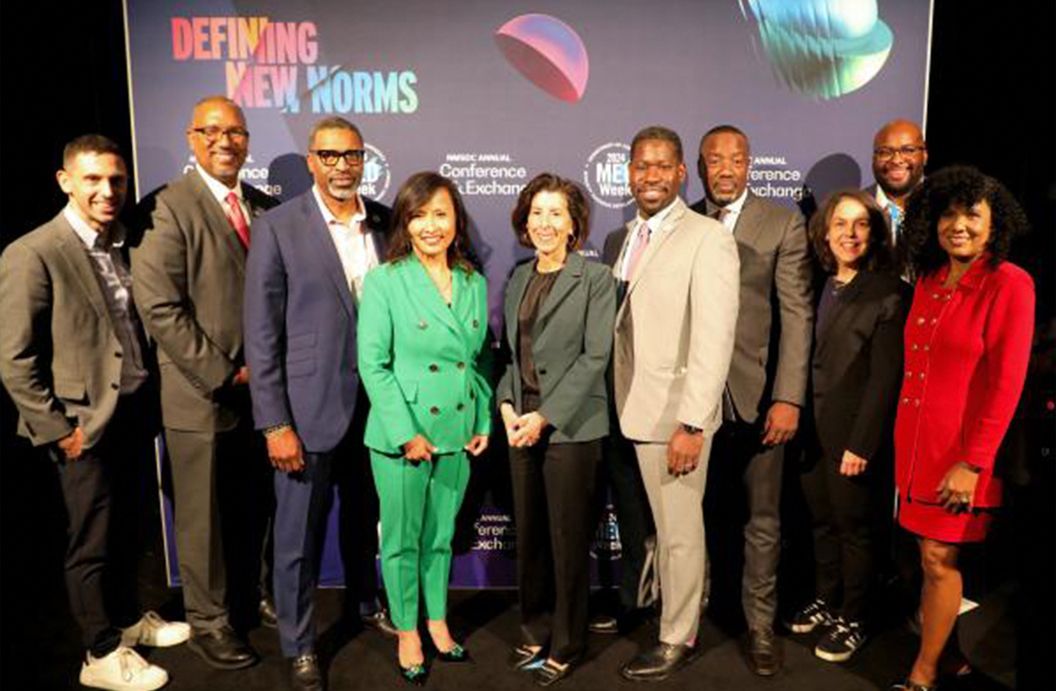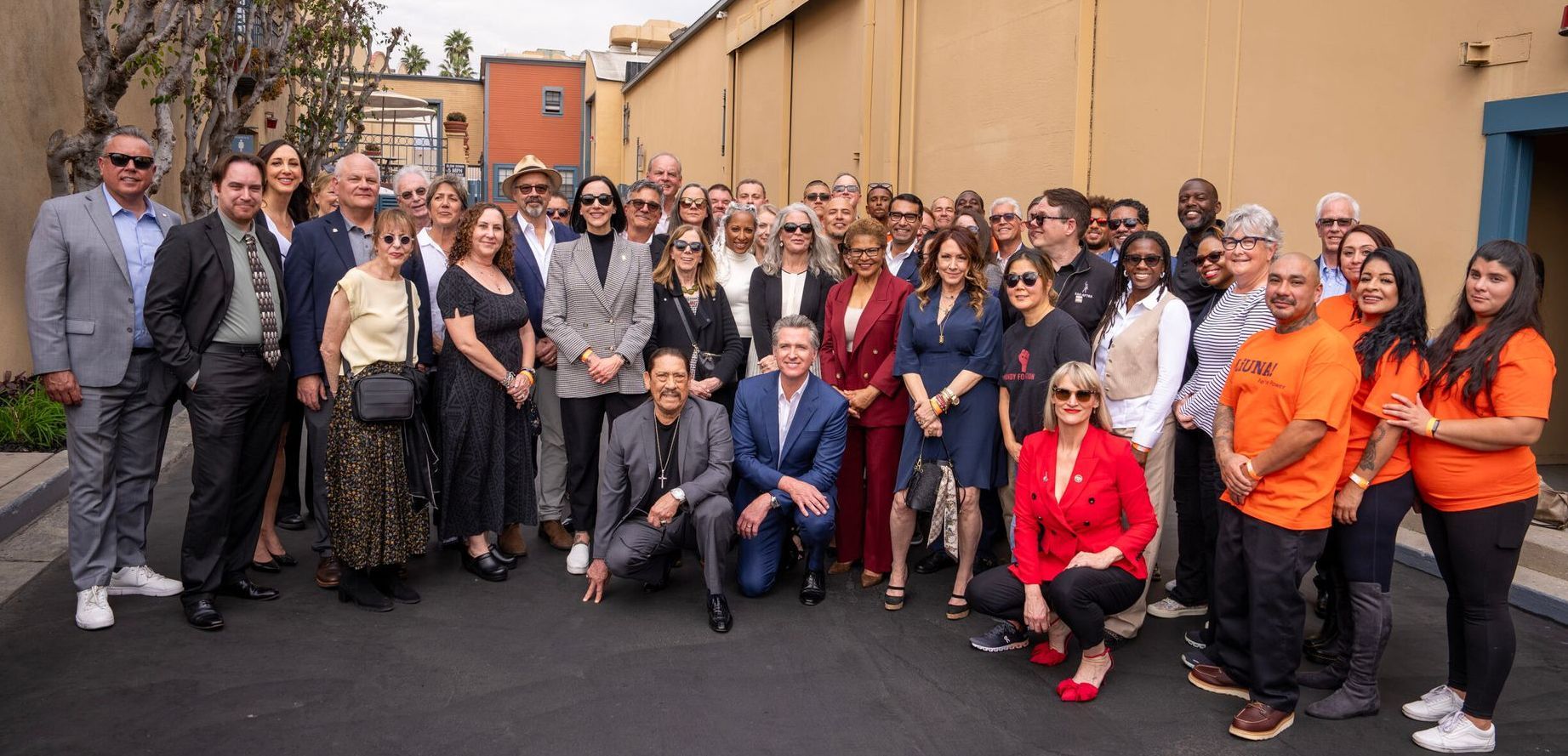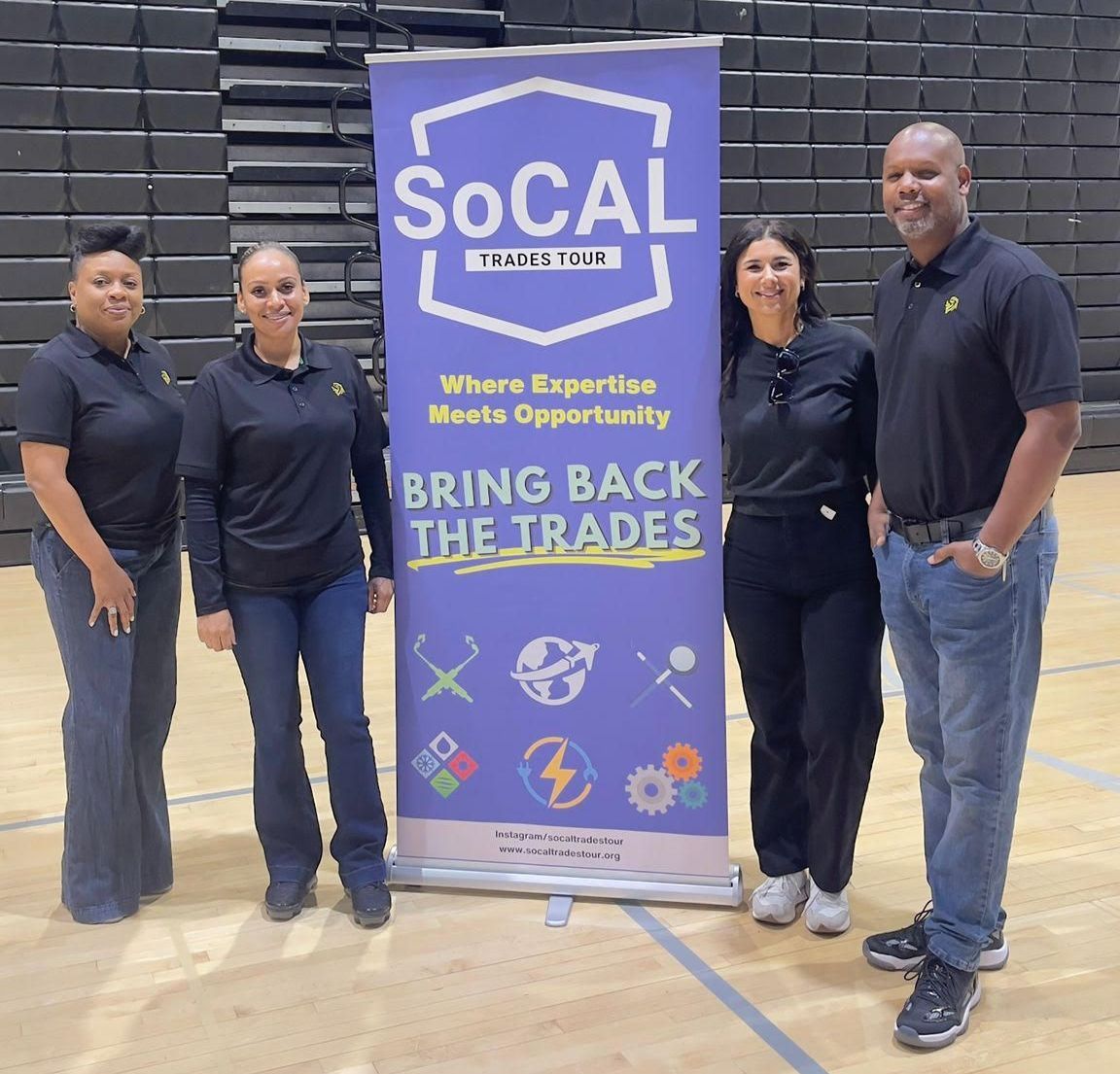Technology
Technology

By Kim Anthony
•
November 13, 2024
Last week, U.S. Commerce Secretary Gina Raimondo and Deputy Secretary Don Graves participated in the 41st Annual National Minority Enterprise Development (MED) Week, where they honored the achievements of U.S. minority -owned business enterprises. Together they reaffirmed the Biden-Harris Administration’s commitment to advancing economic equity and equality and ensuring that minority-owned businesses have the access to capital, technical assistance, and more to help them scale. Held this year in conjunction with the 2024 National Minority Supplier Development Council’s (NMSDC) Annual Conference in Atlanta, the Minority Business Development Agency’s (MBDA) MED Week is a celebration of the talent and ingenuity of the innovators and entrepreneurs who run our Nation’s minority-owned businesses. Minority-owned businesses add incredible value to our economy, generating nearly $2 trillion in revenue annually and generating tremendous consumer loyalty within their communities. Over the last three years, a record number of Americans have started new businesses, with Black and Latino business ownership growing at their fastest rates in 30 years. To date, 16 million jobs have been created under the Biden-Harris Administration. During a fireside chat with NMSDC CEO and President Ying McGuire, Secretary Raimondo stressed the critical role minority businesses play in driving economic growth and the need to ensure this growth remains inclusive. “I firmly believe that our diversity is our greatest strength,” she said. “We will fail to meet our full potential as a Nation unless we harness the talents and strengths of all parts of the country, including people of color, women, and others who are too often left behind.” At an earlier session, Deputy Secretary Don Graves participated in a panel dialogue with cabinet-level and Federal executives on federal investments that support and empower minority business enterprises across the Nation. During the panel, he discussed his role as the Chair of the Interagency Community Investment Committee (ICIC). The ICIC has played a vital role in ensuring that communities know about the federal investments that are available to them and have direct access to the resources, tools, and technical assistance they need to participate and thrive in the economy. Vice President Harris launched the ICIC three years ago, to ensure that billions of dollars of investment flow to and through America’s communities. “The Biden-Harris Administration remains committed to ensuring that minority-owned businesses have access to the resources they need to thrive and grow,” said Deputy Secretary Graves. “If we’re going to out-compete and out-innovate, we need to use the full force of the economy. Everyone will need to participate.” Through funding provided by the Inflation Reduction Act and the CHIPS and Science Act, the Department of Commerce is working to ensure that minority-owned businesses benefit from the billions of dollars that are being invested in the Nation’s infrastructure, manufacturing, and clean energy industries. Key programs include CHIPS for America , Tech Hubs , and the Good Jobs Challenge . These programs are creating thousands of new and good-paying jobs for American workers and providing long-awaited resources and training to communities across America. Last year, MBDA launched the Capital Readiness Program , the largest-ever investment supporting underserved entrepreneurs. MBDA is investing $125 million to launch 43 business incubators and accelerators designed to help minority and underserved entrepreneurs launch and grow their businesses. As part of MED Week, the MED Week awards were presented to businesses, organizations, and individuals for exceptional contributions to minority business growth. The awards are the highest national recognition a minority-owned firm can receive from the U.S. Department of Commerce. For more information, see President Biden’s Proclamation for Minority Enterprise Development Week, 2024.

By Kim Anthony
•
November 9, 2024
As AfroTech 2024 approaches, anticipation is high for discussions celebrating Black excellence in technology. This year, Capital One, known for its leadership in tech innovation and commitment to diversity, will take center stage with a workshop on technology and product management. Leading this session are Alexandra “Alex” Wood, Vice President of Product, and Jared Jordan, Managing Vice President—two visionary leaders advancing Capital One’s tech landscape and exemplifying the company’s dedication to empowering Black talent and pushing technological boundaries. Jared Jordan brings a wealth of experience from industry giants like Google, YouTube, and Netflix, where he led groundbreaking engineering initiatives. At Capital One, Jared focuses on customer identity, data management, and messaging systems, helping protect against fraudulent activity and ensuring customers receive timely communications through their preferred channels. “Capital One’s mission to change banking for good resonates deeply with me,” he shares. “Financial freedom and access are essential to building a more equitable world, and Capital One’s commitment to both technology and diversity made it an easy choice for me.” A Commitment to Diversity and Innovation What distinguishes Capital One is its dedication to integrating diversity at the core of its tech initiatives, a value both Alex and Jared passionately uphold. “In many organizations, HR is seen as a back-office function, but at Capital One, we recognize that to change banking for good, we need to invest in the best people and create the infrastructure that allows them to thrive,” Alex explains. Capital One’s Blacks in Tech (BIT) Business Resource Group is committed to supporting, educating, and inspiring Black technologists at every stage of their careers. BIT aims to amplify its members’ voices, strengthen Capital One’s inclusive culture, and attract top talent from diverse backgrounds. Meet the Leaders: Alex Wood and Jared Jordan Jared echoes the significance of diversity in fueling innovation, emphasizing that building diverse products requires diverse teams. “At Capital One, we’re putting our resources where our values are, ensuring long-term success for our company and our communities,” he states. Jared believes that Capital One sets a standard for inclusivity in tech, particularly through its responsible application of data analytics and artificial intelligence (AI) to improve access and outcomes for all. What to Expect at AfroTech 2024 AfroTech 2024 attendees can look forward to an insightful workshop led by Alex and Jared, where they will delve into Capital One’s technology strategies and product management frameworks. “Our goal is to show that no matter what you look like, where you come from, or what your background is, you can make an impact in tech,” Jared shares. He and Alex will provide insights into aligning product and technology to drive innovation and deliver value. The workshop is designed not only as a learning experience but as an opportunity to inspire and empower. “Building great technology and products is a team sport,” Alex adds. “We want to help attendees see that everyone brings unique strengths to the table, and when those strengths come together, magic happens.” Looking Ahead: The Future of Tech at Capital One Both leaders are optimistic about Capital One’s future. Alex is enthusiastic about creating consumer-grade experiences for Capital One’s associates, envisioning internal processes that are as seamless and engaging as top digital platforms. “Imagine a world where we know what you’re great at and can match you with the perfect role and team,” she envisions. For Jared, the future involves pushing the limits of financial technology while keeping inclusivity at the forefront. “I see Capital One leading in AI, machine learning, and data analytics to enhance financial access for everyone,” he says. His advice to aspiring technologists is simple yet profound: “Stay curious and never stop learning.” Join Capital One at AfroTech 2024 Capital One is excited to participate in AfroTech 2024, connecting with the talented minds shaping the future of technology. Attendees won’t want to miss Alex and Jared’s session on Thursday, Nov. 14, and are encouraged to stop by the Capital One booth to connect with technologists and enjoy some great swag. Both Alex Wood and Jared Jordan bring diverse experiences and perspectives to their roles at Capital One. For Alex, the journey to Capital One wasn’t linear but a discovery of passion. “Like every good daughter of an immigrant, I wanted to be a doctor or scientist, but I found myself drawn to a broader range of interests, ultimately wanting to make lives better by removing friction and adding delight,” she reflects. Alex’s path, which included experience at startups and multinational organizations, led her to Capital One, where she now leads the HR product and data organization team, designing technology systems that enhance the experience of Capital One associates globally, from recruitment and payroll to talent management and learning. Photo Credit: Courtesy of Capital One

By Kim Anthony
•
November 7, 2024
In the bustling heart of California’s Inland Empire, the Caltrans District 8 Small Business office is paving the way for small businesses, disadvantaged business enterprises (DBEs), and disabled veteran business enterprises (DVBEs) to thrive. With a commitment to equity and economic development, this program offers invaluable resources for entrepreneurs and veteran-owned companies eager to participate in state and federal contracting. For Caltrans, small business is more than just a priority—it's the backbone of its procurement mission. Leveling the Playing Field: DBE and DVBE Programs Caltrans District 8 has set ambitious goals to include DBEs in federally funded projects, aiming for a 22.2% DBE participation rate. This certification process ensures that DBEs with social and economic disadvantages have a fair shot in a competitive landscape. DBE firms must meet strict eligibility standards based on ownership, control, personal net worth, and business size, providing them with opportunities to contribute meaningfully to state projects. In addition to DBE support, Caltrans promotes inclusivity for small businesses and DVBEs through state-funded projects. The agency has committed to achieving a 25% small business (SB) and a 5% DVBE participation rate in these projects, reflecting its dedication to empowering entrepreneurs and veteran-owned companies. By doing so, Caltrans not only bolsters local economies but also enriches the fabric of California’s workforce with diverse talents and perspectives. Education and Outreach: Building Skills, Expanding Networks Recognizing the importance of knowledge and networking, the Caltrans District 8 Small Business office hosts an array of educational events throughout San Bernardino and Riverside Counties. These gatherings—such as the Surety (Bonding) Workshop, “How To Do Business With Caltrans” sessions, DBE and SB/DVBE certification workshops, and pre-bid meetings—equip businesses with the tools needed to succeed in state contracting. Through these events, Caltrans aims to create a well-informed, prepared small business community ready to navigate the intricacies of public sector procurement. Tools for Success: Practical Resources for Small Businesses For those looking to take the plunge into state contracting, Caltrans District 8 offers a suite of practical tools. Resources like Contractor’s Corner provide insights into project advertisements, bidding processes, and awards, while the Department of General Services’ eProcurement portal simplifies doing business with the state. The dedicated support for DBEs, DVBEs, and small businesses is a testament to Caltrans’ commitment to fostering a diverse supplier base. To further drive small business success, Caltrans adheres to Government Code Section 14110.3, which sets a 25% participation goal for certified small businesses in non-federal contracts. When this goal applies, small business preferences are visibly displayed on advertised projects, signaling to contractors and small firms alike that Caltrans is serious about meeting its targets. This emphasis on inclusive practices is instrumental in helping small businesses build their portfolios and strengthen their foothold in the industry. How to Get Involved For small businesses and DBEs interested in the opportunities Caltrans provides, the first step is simple: reach out. The Caltrans District 8 Small Business Program is accessible, supportive, and ready to answer questions from prospective contractors. With a dedicated contact at the District 8 Small Business Program office and resources available through the Office of Construction Contract Awards, Caltrans makes it easy for businesses to take the leap. For questions or assistance, interested parties can email the District 8 Small Business Program at d8smallbusiness@dot.ca.gov or call the Office of Construction Contract Awards at 916-227-6299. As the landscape of California’s infrastructure continues to grow, so too does the role of small and disadvantaged businesses in shaping its future. Through Caltrans District 8’s Small Business office, the agency has set the stage for greater diversity, innovation, and economic opportunity within the state's procurement ecosystem. By empowering small businesses, Caltrans is driving not just the roads and highways, but the communities they serve, toward a brighter, more inclusive future.

By Kim Anthony
•
November 7, 2024
SACRAMENTO, CA — In the heart of Sacramento, a powerful advocate for Black business owners and professionals has been fostering economic empowerment and community development for nearly four decades. Established in 1984, the Sacramento Black Chamber of Commerce (SBCC) stands as a pillar of support, uniting African American entrepreneurs, innovators, and professionals. With a vision for lasting economic structure, SBCC is a network of high-energy professionals, all dedicated to advancing the economic, cultural, and civic well-being of Sacramento’s African American community. At its core, SBCC’s mission is about more than just business—it’s about achieving sustainable economic development for Black communities across the region. Through a host of benefits, networking opportunities, educational resources, and advocacy initiatives, SBCC paves the way for members to grow their businesses, expand their influence, and build a supportive professional network that champions their success. Unlocking Opportunity: Member Benefits that Propel Business Growth SBCC offers a rich array of resources and opportunities, starting with its commitment to robust business networking. The Chamber’s regular mixers and events, featuring guest speakers and workshops, create spaces for members to connect, share ideas, and foster new partnerships. These events, alongside collaborations with other African American organizations, strengthen community ties and open doors for professional and personal growth. For businesses seeking workspaces, SBCC provides access to its conference room, available for business meetings and professional use. Members also gain direct business referrals from SBCC staff, who connect them with clients and partners, creating a bridge between Black-owned businesses and Sacramento’s broader business community. But SBCC’s support doesn’t stop there. The Chamber prioritizes entrepreneur education and training, sponsoring seminars on topics such as accessing capital, effective governmental policy, and business matchmaking. SBCC members gain critical business insights and are equipped with the skills needed to thrive in partnerships with organizations like SMUD, Sacramento Regional Transit, and the City of Sacramento. Marketing and Promotion: Elevating Sacramento’s Black-Owned Businesses In a world where visibility is key, SBCC amplifies its members through a variety of marketing and online promotions. Members are spotlighted in the Chamber’s e-newsletter, featured in an online directory, and introduced at New Member Orientations, giving each business a platform to present its unique strengths to a larger audience. The Chamber’s website further promotes member businesses with strategically placed banner ads, event promotions, and email blasts that keep the SBCC community informed and engaged. SBCC also offers member-to-member discounts, encouraging cross-support within the network, and provides advertising opportunities that help businesses gain further exposure within the Sacramento community. This comprehensive marketing support is designed to give members a competitive edge in the local market while nurturing a collaborative spirit within the Chamber. Advocacy, Community, and Beyond: The Broader Impact of SBCC Beyond business support, SBCC champions policy education, advocacy, and community engagement. The Chamber tackles issues that impact African American businesses and fosters a space where members can learn about and advocate for policies that support economic equity and inclusivity. Through these efforts, SBCC has become a voice for Sacramento’s African American community, promoting an environment where businesses can thrive and contribute to the city’s economic and cultural landscape. As SBCC approaches its 40th anniversary, its legacy is clear: a steadfast commitment to uplifting Sacramento’s African American business community. Through advocacy, resources, and a focus on economic empowerment, the Sacramento Black Chamber of Commerce remains a beacon of opportunity, a foundation of support, and a bridge to a brighter, more inclusive future for all.

By Kim Anthony
•
November 7, 2024
Join the Sacramento Black Chamber of Commerce for its 39th Annual Board Installation and Awards Dinner, a celebration of leadership, excellence, and community achievements. This special evening will honor distinguished business and community leaders who have made significant contributions to Sacramento and will also welcome the newly appointed board members. Guests will enjoy an inspiring program, valuable networking opportunities, and the chance to connect with prominent entrepreneurs, civic leaders, and innovators. From seasoned professionals to those beginning their journey, attendees can celebrate progress and be inspired by individuals making a difference. The evening will include a delectable dinner, live entertainment, and a celebration of the best of Sacramento’s Black business community. Key Highlights: Installation of the Board of Directors, who will shape policies and oversee the Chamber Foundation. Fundraising for the Young Leadership Collaborative (YLC), which has prepared nearly 300 young adults (ages 16–23) for entrepreneurship, financial literacy, and leadership since 2009. Presentation of awards in the categories of Non-Profit of the Year, Small Business of the Year, and Champion of the Year. Sponsorship and Ticket Details: Individual tickets, tables, and sponsorship packages are available. Each sponsorship includes a table for eight. For sponsorship requests or questions, email info@sacblackchamber.org . Sponsorship deadline is November 29, 2024. Reserve a spot today for an unforgettable night of celebration, inspiration, and community support!

By Kim Anthony
•
October 27, 2024
HOLLYWOOD, Calif. (Oct. 27, 2024) – Governor Gavin Newsom today proposed expanding California’s Film & Television Tax Credit Program from the current $330 million annual allocation to $750 million annually. The massive increase to the program, which is administered by the California Film Commission (CFC), would allow California to outpace other states offering tax credits, luring more entertainment industry projects back to the Golden State. “California is the entertainment capital of the world, rooted in decades of creativity, innovation and unparalleled talent,” Governor Newsom said. “Expanding this program will help keep production here at home, generate thousands of good paying jobs, and strengthen the vital link between our communities and the state’s iconic film and TV industry.” “California needs to keep pace with competing states and nations in providing aggressive tax incentives,” said Colleen Bell, Director of the California Film Commission. “The Governor’s bold plan will accelerate these efforts and assure California remains the production center of the entertainment industry.” The economic value of increased production pays dividends on many fronts: A study of the tax credit program found that, for every tax credit dollar approved, it generated and created at least $24.40 in output , $16.14 in GDP, $8.60 in wages, and $1.07 in initial state and local tax revenue resulting from production in the state. Since its inception in 2009, California’s Film & Television Tax Credit Program has generated over $26 billion in economic activity and supported more than 197,000 cast and crew jobs across the state. According to Bell, the program has been oversubscribed year after year, with more productions applying than can be accommodated under the current budget cap. The results have been tangible. In recent years, projects unable to secure California’s tax credits moved to other locations. That migration caused significant economic losses, with an estimated 71% of rejected projects subsequently filming out-of-state . Many other projects chose not to apply due to the limited funding, suggesting that total runaway production losses are likely much higher. For example, between 2020 and 2024, data shows California lost an estimated $1.6 billion in production spending due to limited tax credit funding , directly impacting state jobs and local economies. Despite these challenges, the CFC has enjoyed some major recent wins through the tax credit program, including: September 2024: Indie films and “Suits LA. ” $51.6 million to support 19 projects, including 15 independent Expected to generate $284.4 million in spending, with $112.1 million allocated to wages, and over 3,800 jobs. July 2024: Five new TV projects, including HBO’s “Latitude” and 20th Television’s “All’s Fair.” $58 million in tax credits went to five television projects, which was expected to generate $386 million across 438 filming Estimated to support 15,869 background performers, 1,196 crew members, and 685 cast members. March 2024: Amazon’s Fallout relocated to California . $152 million in tax credits went to 12 projects, including Fallout’s second season relocating from New York. Projected to bring in over $1.1 billion in spending across the state and support 4,500 cast and crew members, plus 50,000 background performer days. December 2023: The Mandalorian & Grogu to film in With a total of $400 million allocated to 15 projects, including Lucasfilm’s The Mandalorian & Grogu alone that was set to inject $166 million into California’s economy. Nearly 20,000 jobs created, including 2,252 crew and 598 cast. Other productions included “The Accountant 2” by Amazon Studios, “Untitled 20th Film,” Disney’s untitled live-action feature. In 2023, Governor Newsom signed a five-year extension of the program, including new workforce diversity provisions , more funding for the Pilot Career Pathways Training Program , and the nation’s first Safety on Production Pilot Program . Furthermore, tax credits will become refundable for the first time since the program’s inception in 2009, beginning with the 2025-26 fiscal year, with Program 4.0 set to commence on July 1, 2025.

By UBJ Staff
•
October 21, 2024
In an era where the lines between profit and purpose are increasingly blurred, businesses that focus on social entrepreneurship are transforming the way we think about community development. These ventures are designed not only to generate revenue but to address societal challenges in innovative ways. One such example is Care Staffing Professionals , a healthcare staffing company that contributes significantly to the social and economic resilience of underserved communities. By focusing on critical needs like healthcare access and job creation, this business model exemplifies how strategic entrepreneurship can build stronger, more resilient communities. Central to this mission is the involvement of the Lampkin Foundation , which helps amplify the social impact through community-focused initiatives and programs. Addressing Healthcare Needs in Underserved Areas Access to healthcare is a fundamental issue that disproportionately affects underserved communities. Many rural or economically disadvantaged regions face persistent shortages in healthcare staff, limiting their ability to provide adequate medical care. Care Staffing Professionals has stepped in to address this gap, providing healthcare facilities with the personnel they need to serve their patients. By supplying these essential workers, the company ensures that even the most vulnerable populations can receive the care they need, contributing to the overall health and stability of these communities. Beyond simply filling vacancies, the company adopts a strategic approach to ensure that its placements align with the needs of each facility and community. By focusing on areas where healthcare is most needed, Care Staffing Professionals helps reduce the disparities that often leave low-income populations with inadequate access to medical services. This approach also improves long-term health outcomes by creating a more stable healthcare infrastructure in areas that traditionally suffer from neglect. In doing so, the company plays a crucial role in fostering community resilience, ensuring that residents have access to consistent, quality healthcare. Economic Empowerment Through Job Creation Another significant way in which Care Staffing Professionals contributes to community resilience is through job creation. Employment is one of the most direct pathways to economic stability, and by creating jobs in the healthcare sector, the company provides individuals with opportunities for financial independence and career growth. Many of the positions offered through Care Staffing Professionals cater to individuals from underserved backgrounds, providing them with meaningful employment that offers not only a steady income but also the chance to develop new skills. These job opportunities are particularly impactful in economically disadvantaged regions where unemployment rates are often high, and career advancement opportunities are limited. By offering stable employment, the company helps lift individuals out of poverty and creates a ripple effect that strengthens the local economy. As more people gain access to steady jobs, local businesses benefit from increased spending power, further contributing to the economic resilience of the community. Additionally, the company prioritizes professional development, ensuring that its employees have access to training and resources that enable them to advance in their careers. This emphasis on growth fosters a cycle of empowerment, where workers are not only filling immediate job needs but are also building long-term careers. This model of job creation and development is key to fostering a resilient workforce that can adapt to changing economic conditions and continue contributing to their communities for years to come. Strengthening Community Ties Through Collaboration Social entrepreneurship often relies on collaboration to maximize its impact, and Care Staffing Professionals is no exception. The company works closely with healthcare providers, local governments, and community organizations to ensure that its efforts are aligned with the needs of the populations it serves. By engaging with stakeholders across various sectors, the company can tailor its services to address specific challenges within each community, whether that involves staffing shortages in hospitals or providing training programs for aspiring healthcare professionals. This collaborative model strengthens the social fabric of the communities served, building trust and cooperation among residents, healthcare providers, and other key stakeholders. As these relationships deepen, the communities become more resilient, better equipped to face future challenges, and more capable of sustaining long-term growth. Building a Sustainable Model for the Future One of the most compelling aspects of social entrepreneurship is its focus on sustainability. Unlike traditional businesses, which may prioritize short-term profits, companies like Care Staffing Professionals build their models around long-term social impact. By addressing healthcare needs and providing stable employment, the company creates a foundation for sustainable growth within underserved communities. The emphasis on sustainability also extends to environmental and social considerations. As healthcare providers become more integrated into these communities, they are better positioned to deliver preventive care, reducing the long-term strain on healthcare systems. Moreover, as residents become more economically empowered, they are more likely to invest in their own communities, fostering local development that benefits future generations. Through its efforts, Care Staffing Professionals demonstrates that social entrepreneurship is not just about addressing immediate needs but about creating the conditions for long-term resilience. This focus on sustainability ensures that the benefits of the company’s work will continue to be felt for years to come, contributing to a healthier, more economically stable future for underserved populations. The Power of Social Entrepreneurship The work of Care Staffing Professionals exemplifies the transformative power of social entrepreneurship. By addressing critical issues like healthcare access and economic empowerment, the company plays a vital role in building resilient communities. Through strategic collaboration, job creation, and a focus on sustainability, this business model offers a roadmap for how companies can make a lasting social impact while remaining financially successful. The involvement of foundations and community-focused initiatives further amplifies this impact, ensuring that community-driven programs remain at the forefront of the company’s mission. Together, these efforts demonstrate that social entrepreneurship is not just about doing good; it’s about creating sustainable, long-term solutions that empower individuals and uplift entire communities.

By UBJ Staff
•
October 19, 2024
Deidre Mathis is once again making history in Houston, Texas as the owner of Wanderstay Boutique Hotel, the city's first adults-only themed hotel. It is another remarkable achievement for Mathis, who also made history in 2018 when she launched the first Black-owned hostel in the United States.

By Cherish H.
•
October 14, 2024
(Left to right) Rhonesia Perry - The Gentleman’s Society, Board Advisor, Crystal Anthony - The Gentleman’s Society, Committee Chair, Vanessa Tilford - SoCal Trades, President and Damien Halliburton - The Gentleman’s Society, President and CEO In an exciting new collaboration, the SoCal Trades Tour and The Gentleman’s Society have joined forces to bring career pathways and college opportunities to students across the San Gabriel Valley. This strategic partnership recently culminated in a five-day tour, reaching six high schools and impacting over 6,000 students, making a substantial impact on the future workforce. During the October 11th event hosted at South Hills High School, nearly 50 exhibitors engaged with students, providing hands-on insights into various career options. Among the exhibitors were key government agencies such as the FBI, Marine Corps, and Army recruiters, alongside local businesses within 15 miles of the school. The proximity of job opportunities allows students easy access. This powerhouse partnership between the Gentleman’s Society and SoCal Trades Tour will assist students in both their personal and professional development. Damien Halliburton, President and CEO of The Gentleman’s Society, highlighted the importance of this initiative for boys of color, who are often overlooked in traditional career outreach efforts. “This was an optimal opportunity for our organization to connect with young men who need guidance and support as they navigate both life and career decisions,” Halliburton said. His organization is dedicated to offering mentorship and professional development to help students build a solid foundation for future success. The tour drew attention from educational administrators, including a representative from Jurupa Valley Unified School District and Moreno Valley, who visited the event to observe its impact and explore opportunities for their districts. Vanessa Tilford, owner of SoCal Trades Tour, shared her enthusiasm for the event’s success and its potential for expansion. “We have the capacity for more exhibitors, and we are the first to leverage technology to connect students and businesses, making it easy to follow up and track each student’s progress,” Tilford explained. This innovative approach aims to help students maintain meaningful connections with employers and open doors for future opportunities. Together, SoCal Trades Tour and The Gentleman’s Society are eager to expand their reach across Southern California to continue fostering opportunities for students. For more information about becoming an exhibitor and how to schedule your school site; email info@gotgs.org . Feel free to visit www.socaltradestours.org and www.gotgs.org for more information. This event not only highlights the commitment to creating pathways for students but also reinforces the vital role that strategic partnerships play in shaping the future workforce throughout the SoCal region.

By Rhonesia Perry
•
October 12, 2024
(Left to right) Damien Halliburton, and Isaac Lowery, President and Vice-President, respectively, of the Gentleman’s Society | Photo credit: Rhonesia Perry The National Black MBA Association - Los Angeles Chapter recently held its prestigious annual Awards Gala, a highly anticipated event that honors influential business leaders, investors, and equity change-makers. This year’s gala, which raised more than $30,000 in scholarships for students at different stages of their academic journeys, highlighted the chapter’s commitment to fostering future business professionals. One of the most notable moments of the evening was the recognition of Isaac Lowery , Vice President of the Gentleman’s Society, as Chapter Member of the Year. This award is a rare honor, given only to individuals who demonstrate a servant’s heart and a deep commitment to the organization’s mission. Lowery’s dedication to serving in various roles within the chapter was highlighted as a prime example of selfless leadership. One of the awardees and notable speaker, venture capitalist Arlan Hamilton , left a lasting impression on the crowd of MBA professionals with her empowering message. “Be yourself so other people can find you,” Hamilton told the audience, sharing her personal journey and her inspiring goal of cultivating and funding 100 millionaires. Hamilton’s words resonated deeply, especially with those who are pursuing entrepreneurial ventures. Her mission to invest in diverse entrepreneurs emphasized the importance of organizations that actively support personal and professional growth. Damien Halliburton , President of the Gentleman’s Society, also shared his thoughts, recognizing the gala as a powerful platform for building lasting partnerships. The event stood as a reminder that collaborations between leaders and rising stars are essential for sustaining the progress and success of the Black business community. This year’s gala was not just a celebration of individual achievements but a reflection of the collective effort to elevate Black professionals in business, while making significant contributions to the next generation of leaders. The event was an inspiring testament to the impact that intentional community building and advocacy can have in shaping a brighter future. For more information on how to join the National Black MBA - Los Angeles Chapter go: https://nbmbaa.org/joinnbmbaa/ To learn more about Gentleman's society contact: Join@GoTGS.org
